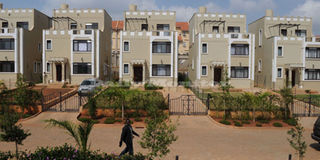Prime
Office occupancy rates drop, retail rebounds

The decline, according to Knight Frank, was due to a shift in business strategy, especially by corporate organisations, amid the increased need to operate businesses efficiently. PHOTO/FILE.
Prime commercial office occupancy in Kampala has continued to drop, capping 2020 at 6 per cent from 4 per cent in the first half.
The drop has been most visible in upscale office locations of Nakasero, Naguru, Kololo, Lugogo, Nakawa, Bugolobi and Ntinda.
According to details contained in the Knight Frank bi-annual report on the Kampala market real estate performance, the drop in office occupancy moved from 17 per cent in 2019 to 23 per cent in 2020.
The report reviewed the performance of office, residential, retail, valuations, and industrial property for the period from July to December 2020 against the country’s economic performance over the same period.
Ms Judy Rugasira Kyanda, the Knight Frank managing director, said the decline was due to a shift in business strategy, especially by corporate organisations, amid the increased need to operate businesses efficiently.
Some organisations, she said, have downsized while others are relocating to more affordable offices and postponing to take on new office space because of constrained cash flows.
A number of businesses have been cutting on new commitments due Covid-19 uncertainties and a fall in business activities.
However, the report noted that office occupancy is expected to rebound this year, before peaking in 2022 on the back of increased investment in oil, whose announcement of the Final Investment Decision is expected this year.
Ms Rugasira said that they expect a number of organisations to continue to downsize while others will be getting into more sub- leasing agreements.
This, she said, means there will be an increase in demand from smaller office occupiers particularly small and medium enterprise, non-government organisations and professional firms, especially those that work from home as a semi-permanent option.
“Flexible lease terms are expected to characterise several tenancies for the next 12 to 18 months. We observed that tenants are increasingly requesting for flexibility in the duration of their tenancies as opposed to fixed lease periods of two to three years,” Ms Rugasira said.
Retail sector rebounds
However, the report also indicated that retail occupancy for the period under review had recorded significant improvements, demonstrating resilience, amid Covid-19 related disruptions.
This was largely attributed to relief incentives such as rent deductions and deferred payments, which a number of landords offered, especially during the Covid-19 lockdown.
Mr Marc Du Toit, the Knight Frank head of retail, said the growth was also a result of entry in new retail businesses such as Carrefour, a French retailer, LC Waikiki, a Turkish fashion chain and the expansion of Shoprite stores across Kampala.
Residential and Industrial
According to the report, the residential sector reported a 6 per cent year-on-year increase, especially in upscale locations of Kololo, Nakasero, Bukoto, Bugolobi, and Naguru.
However, a number of dealers have had to discount their properties in order to remain competitive in a market already stressed by a number of disruptions, key among them over supply.
The report recorded the industrial sector as the biggest beneficiary of the lockdown due the increase in e-commerce trade during the lockdown.
This was due to the increased need for stockpiling, which created demand for storage space in the traditional industrial areas of Nalukolongo, Ntinda, and Nakawa.
Average rental rates remained stable between $2.5 (Shs9,000) to $ 6 (Shs2,1000) per square metre for warehouses.
However, the Kampala Industrial Area remains a top destination for large industrial companies looking to construct their own premises as opposed to renting.




